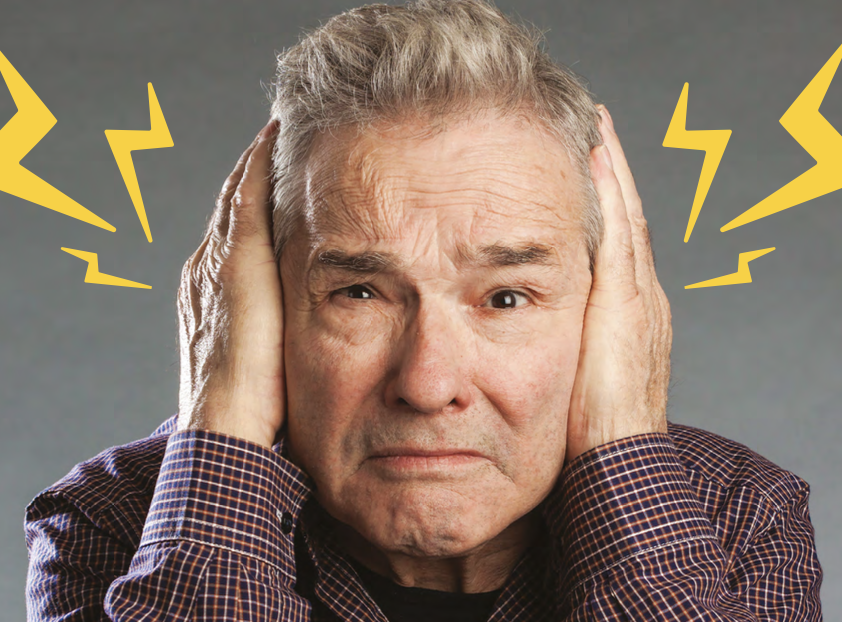By Wendy Haaf
Though it’s rarely caused by anything serious, tinnitus can have life-changing effects
Gael Hannan, 69, may have profound hearing loss, but the hearing-health advocate and writer is nonetheless dogged by a cacophony of loud sounds she would much rather live without.
About eight years ago, Hannan, who lives near Victoria, began hearing a loud ringing in her ears that continued day in and day out. “It never went away,” recalls Hannan, who has since written two books, including Hear & Beyond: Live Skillfully With Hearing Loss (with Shari Eberts; Page Two Press, 2022).
The name for Hannan’s unwanted companion? Tinnitus. “It’s just a fancy medical word for noise in the ear with no external source,” explains Dr. Darren Tse, an otolaryngologist (ear, nose, and throat specialist) at the Ottawa Hospital. Tinnitus isn’t considered a disorder in itself but rather a symptom.
Note that Tse doesn’t say “ringing in the ear,” which is just one possible manifestation. “The most common is a high-pitched whining noise, but some people describe it as sounding like crickets or cicadas,” he says. Hannan, for example, says that for her, “it’s not static—it’s different noises.” Some people she’s spoken to reported hearing “not just one hum or beep—it’s an orchestra of instruments each playing a song badly to its own beat; everyone’s tinnitus is different.”
What It Is
A large number of Canadians are on intimate terms with this unwelcome phenomenon. A 2019 study by Canadian Hearing Services (CHS) and Statistics Canada, using data from the Canadian Health Measures Survey, found that “an estimated 37 per cent of Canadians had experienced tinnitus in the previous year,” says Rex Banks, one of the co-authors, who is an audiologist with a doctoral degree and the director of Hearing Health, Quality, and Global Partnerships at CHS. (Audiologists are health professionals who diagnose and manage hearing and balance disorders.) “For seven per cent of those who experienced it, tinnitus was bothersome, meaning it affected their sleep, their concentration, and their mood,” Banks says.
Indeed, mental and emotional distress and fractured sleep due to tinnitus may at least exacerbate, if not cause, conditions such as depression. In the same survey, for example, the rate of mood disorders among people with bothersome tinnitus was more than twice that among adults without tinnitus—17 per cent versus eight per cent.
The underlying cause of tinnitus is seldom dangerous. “Very rarely is it a sign of anything bad,” Tse says. “Probably less than one per cent of all people with tinnitus have a serious reason for it, and even then, we’re not talking cancer or anything.”
For instance, so-called pulsatile tinnitus—a heartbeat-like or whooshing noise—is usually related to problems with blood vessels in and around the ear. While these problems are often relatively benign, if your tinnitus has a throbbing quality or you hear it on one side only, you should see your doctor to rule out any medically significant conditions that need to be addressed, such as high blood pressure. (Even in the absence of these potential red flags, it’s worth visiting your primary-care provider to check for a range of other possible causes, such as side effects from certain medications.)
“Tinnitus does not cause hearing loss,” Hannan stresses, “although some people worry about that.” In fact, it seems to work the other way around—hearing loss commonly precedes tinnitus.
According to the Hearing Health Foundation, a US-based non-profit funder of hearing and balance research, 90 per cent of tinnitus cases occur with an underlying hearing loss. Yet an estimated 40 per cent of those affected aren’t aware they’re straining to hear. This loss “can be caused by factors such as aging or exposure to loud noise,” Banks says, “and both of those are strongly associated with tinnitus.”
It’s not entirely clear how hearing loss can trigger tinnitus. What does seem certain, however, is that the noise “is actually coming from our brain,” Banks says. According to one line of thinking, he explains, “our ears are in a constant state of readiness to receive sound, and when we develop hearing loss, they are deprived of sound.”
In response, “some sort of mechanisms within the auditory central nervous system attempt to compensate for that loss, and those mechanisms generate tinnitus,” says Philippe Fournier, an audiologist and assistant professor of audiology in the Department of Rehabilitation at Université Laval. This may explain why the phantom noise typically lies within the same frequency range that’s most affected by the hearing loss.
Glynnis Tidball, an audiologist with the Tinnitus Clinic at St. Paul’s Hospital in Vancouver, thinks of tinnitus as a noise in the brain that becomes perceptible when we’re receiving less sound from the outside world. “Some people can modulate their tinnitus with some kind of neck or facial movement, or jaw clenching, and that speaks to a shift in the neural-circuitry noise that’s brought on by muscle tension,” she says. This phenomenon, known as somatic tinnitus, sometimes improves when it’s treated by a physiotherapist or dentist with experience in this area. “People who have tinnitus that is due to muscle tension may find that it improves with the right physical therapy or a splint or night guard,” Tidball explains.
The same compensatory process that produces phantom sound may also be responsible for a condition that affects nearly half of people with tinnitus—hyperacusis, or hypersensitivity to sound. Think of it this way: nerve cells in a part of the brain be- come more active as it tries to turn up the volume, and the person perceives this increase in traffic as tinnitus. And in many people, this boost in brain activity somehow cranks up external sounds to uncomfortable levels, too.
Unfortunately, “no one has discovered a magic cure for tinnitus,” Tse says. For instance, there’s no evidence that any vitamins or other nutritional supplements can help, although “many people with tinnitus are so desperate, they’ll try anything,” Hannan observes.
What Can Be Done
The absence of a cure, however, doesn’t mean tinnitus isn’t treatable. “There are things you can do to re- duce the impact tinnitus has on your life,” Fournier says.
“Just getting some general education to demystify tinnitus is a good first step,” Banks says. “It can ease anxiety by helping people recognize that it’s unlikely to be due to any serious medical condition. And through education, people can learn to develop coping techniques and strategies.” In fact, a 2020 review and meta-analysis of nine trials found that “educational counselling alone helps to improve tinnitus and related problems.”
Most audiologists can provide basic evidence-based information about tinnitus and strategies for man- aging it. You may be able to find an audiologist in your area by asking your doctor or by contacting your local hospital or hearing clinic. You can also use the “find a professional” directory in the “for the public” section of Speech-Language Audiology Canada’s website.
Among other things, an audiologist can check for and correct one possible cause of tinnitus—earwax pressing against the eardrum. They can also test your hearing “and look at ways to improve hearing function,” Tidball says.
Needless to say, hearing aids are one tool for improving hearing function. And in many cases, they make the phantom noise fainter, too. “A lot of studies have shown that almost one in two people with tinnitus will see an improvement by wearing a hearing aid,” Fournier says.
“We think that it works by giving the brain something else to listen to so you naturally don’t pay as much attention to the noise,” Tse explains. “Your brain ignores all sorts of stuff every day. If you go into a smelly place, after 30 seconds, you don’t notice the smell anymore. That’s just one example of how the brain ignores things that it knows are not dangerous.”
If you do consider aids, it’s worth asking your provider if they have experience and training in working with patients with tinnitus. “There are some considerations that are different from simply fitting hearing instruments for hearing loss—primarily that a lot of people with tinnitus have a lower sound tolerance,” Tidball ex- plains. “Just putting hearing aids on and not accommodating that might be too much.” In addition, she says, “you want someone who is committed to providing consistent follow-up, since there may be more follow-up appointments required than with hearing loss alone.”
Audiologists can suggest addition- al strategies that may help train your brain to stop focusing on tinnitus. For example, if tinnitus interferes when you’re trying to fall asleep, playing pleasant sounds such as waves or waterfalls on a tabletop sound generator or smartphone app, “may be more comforting for your brain to listen to than its tinnitus,” Banks says.
“Another treatment that has been demonstrated to be effective in randomized controlled trials with strict methodology is cognitive behavioural therapy,” Fournier says. Cognitive behavioural therapy (CBT) is a structured method of unlearning automatic negative thoughts that escalate emotional distress. “Anxiety and tinnitus have a synergistic relationship—one will amplify the other, and it just volleys back and forth,” Tidball explains.
“Stress levels and poor mental health can amplify tinnitus.” Teaching yourself to respond more neutrally to tinnitus sends your brain the message that the sound isn’t a danger signal so it’s safe to focus elsewhere.
CBT usually involves a set number of counselling sessions with a mental- health professional who’s had specialized training. However, other more accessible methods of delivering this form of therapy are being explored. For instance, a chatbot-based smart- phone app called MindEar combines CBT exercises, mindfulness training, and “therapeutic soundscapes.” The program has yet to be tested in large clinical trials, but a very small preliminary study found that 64 per cent of users saw clinically significant improvements on scores of tinnitus distress, depressive symptoms, and anxiety levels after 16 weeks.
Emerging evidence suggests that a new form of treatment called bimodal therapy may be helpful as well. This involves simultaneously stimulating both the hearing system and the nerves either in the tongue or the face and neck, depending on the device. “It has shown some promising effect,” Fournier notes. One thing that’s not yet clear is whether patients with any type of tinnitus might bene- fit or just those with the somatic subtype, he adds. “A lot of people have high hopes for this therapy.”
In Hannan’s case, techniques using sound to direct attention away from tinnitus would have been counter- productive, since she has a relatively rare type called reactive tinnitus that becomes louder in response to noise. (Hannan began using hearing aids decades before developing tinnitus and still wears one in addition to a cochlear implant.)
Things that she’s found helpful include peer support through Facebook groups, regular cardiovascular exercise, and a form of mindfulness meditation she learned via an eight-week class for those with tinnitus. “It introduced me to mindfulness, understanding more about how the brain works, and neuroplasticity [the brain’s capacity to rewire itself ],” Hannan says. “With mindfulness, you focus on your breathing, which calms the brain and your emotions.”
“When I first got tinnitus, I thought, ‘How am I going to live with this for the rest of my life?’” she recalls. “That thought is very stressful for people— ‘How am I going to do this?’” While Hannan admits that some days are better than others, she learned that there are ways to deal with this. “The thing to understand is that your life isn’t over and there’s a lot of research going on.”






